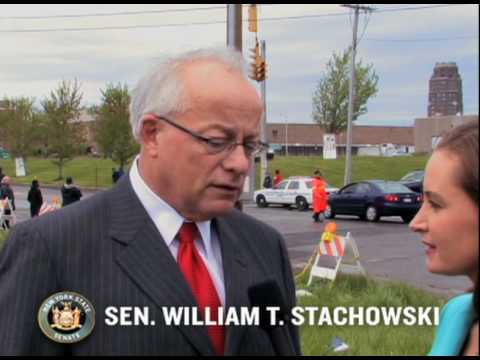
Senator Dale M. Volker Passes State Senate Budget Reform Package
(Depew, NY) Senator Dale M. Volker (R-I-C, Depew) today announced that The New York State Senate passed budget reform legislation to require even greater itemization of State spending and make additional reforms to the budget process. The bills go beyond the budget reform law signed last week and include greater reforms to further increase accountability, openness, and transparency in the State budget process and ensure passage of on-time budgets.
The Senate will act on its original budget reform initiative (S.2) that would line out in the budget every dollar to be spent by the Governor, Legislature, Judiciary and all State agencies and appropriated spending for authorities. The Senate is also expected to give second passage today to a constitutional amendment (S.3), passed by both houses in 2005, to ensure that the Executive Budget addresses only fiscal matter, rather than trying to make new laws and policy in the context of the budget language.
"For several years now, the State Senate has been passing budget reform proposals that would make the State of New York’s budget process more open, transparent and accountable to the taxpayers of New York State," said Senator Volker. "Today’s legislative actions reinforce our commitment to our citizens that those state funds earmarked and allocated within the State Budget, are made fully public and scrutinized. It will ensure that every dollar is wisely spent and beneficial for our residents, our not-for-profit organizations, and our hardworking taxpayers."
The bills to be acted on by the Senate include the following:
Line Out Spending in the State Budget (S.2)
The Senate will act today on budget reform legislation (S.2) that would line out in the budget every dollar to be spent by the Governor, Legislature, Judiciary and all State agencies and appropriated spending for authorities.
Public Authorities Control Board (S.2)
The Senate budget reform bill would also eliminate the need for the State Public Authority Control Board (PACB) to approve capital projects already authorized in the budget to prevent major projects from being held hostage for political reasons and to bring greater openness and accountability to the process.
The reform package would also change the types of projects that require Public Authorities Control Board (PACB) approval. Capital projects that have been itemized within an appropriation bill would no longer require PACB approval. These projects will have already been negotiated between both houses of the Legislature and the Executive and clearly defined within an appropriation bill, meaning that PACB approval of such a project would be superfluous.
Currently, PACB approval is required for all projects financed through ten specific authorities. The PACB reforms in this legislation would require all Public Authority projects financed with State funds to be specifically lined out in the State budget and approved by the Legislature to move forward. Since the Governor and Legislature will have to approve these projects in the budget, PACB approval will no longer be required.
In order to maintain oversight over Public Authority spending, PACB approval will remain for projects related to housing, hospitals, and other projects which are financed through certain public authorities, but do not use state funds.
Budget Reform Constitutional Amendment (S.3)
As part of the budget reform effort, the Senate is also expected to give second passage today to a constitutional amendment that addresses concerns raised by Court of Appeals decisions, regarding the power and authority of the Governor and the Legislature in the budget process.
The amendment would ensure that the Executive Budget submitted by the Governor could be acted upon by the Legislature to ensure an appropriate balance of power. Currently, the Governor is able to submit an Executive Budget which unilaterally changes law without providing the Legislature with any opportunity to either amend or reject those changes.
The constitutional amendment, passed by both houses in 2005, would require that budget bills submitted by the Governor include appropriations which are either constrained by the provisions of existing law or are consistent with separately proposed legislation intended to amend existing law.
The amendment would also allow the Legislature to amend any appropriation which was not submitted in accordance with that requirement, thereby maintaining an appropriate balance of power by prohibiting the Governor from unilaterally changing state law.
Finally, the amendment would require greater specification and itemization of appropriations and require the Legislature to explain the fiscal impact of any additions to the Governor’s budget and identify the funding to pay for them.
####
